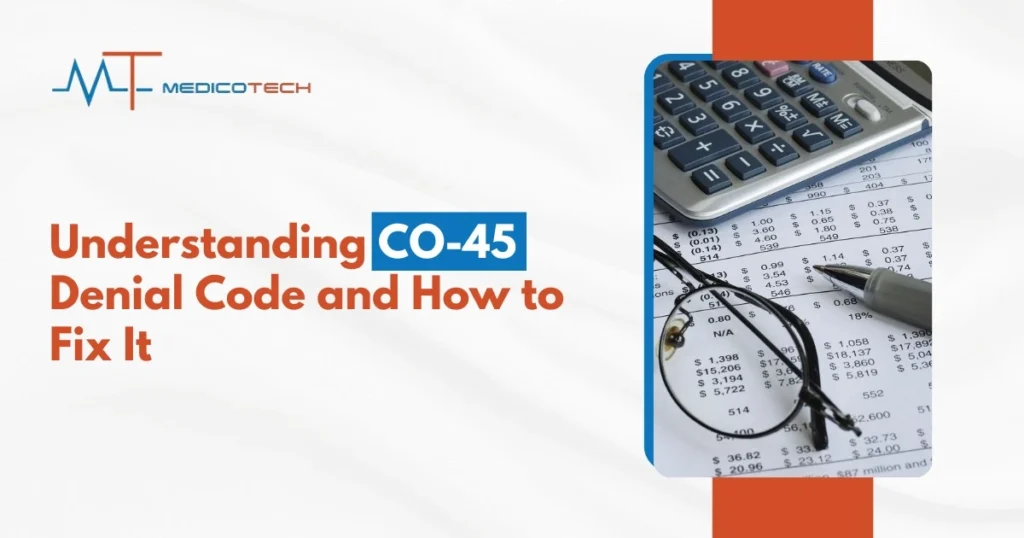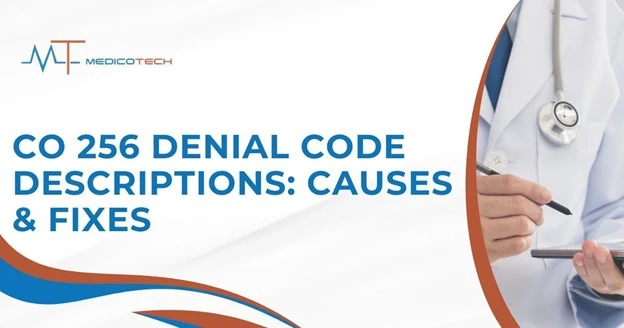However, during the intricacies of healthcare billing, it always happens that one experiences denial codes. CO-45 denial code is one of the denial codes you can encounter, which deals with such a problem as with charge more than the fee schedule. This paper is going to explain in detail the code CO-45 denial code, its reasons, and step-by-step procedure on how to resolve the same and tips on how to avoid such denials in future.
What is the CO-45 Denial Code? Definition and Context
The CO-45 denial code is issued when the charges submitted for a healthcare claim exceed the maximum allowable amount as outlined by the payer’s fee schedule. Essentially, it means the insurer or payer is not reimbursing the full amount requested due to limits defined in their contract or fee schedule.
Official CARC Definition: Charge Exceeds Fee Schedule/Maximum Allowable
The CO-45 denial code reason is typically seen when a provider submits a charge that surpasses the amount allowed under the payer’s fee schedule or contract. These limits are pre-established amounts that the insurance company or payer agrees to pay for specific healthcare services.
When You’ll See CO-45 on Remittance Advice (RA/EOB)
You’ll usually encounter CO-45 on your remittance advice (RA) or explanation of benefits (EOB) when a claim is submitted with charges that are higher than the payer’s set fee schedule. The CO-45 denial code description often appears in scenarios where the healthcare provider has not adhered to the contract rates or when incorrect billing practices are applied.
CO-45 vs. Other Fee-Related Denials (CO-44, CO-97)
Understanding the difference between CO-45 and other similar codes is essential for accurate claim management. For instance, CO-44 occurs when charges exceed the contracted allowance but aren’t related to a specific fee schedule. On the other hand, CO-97 refers to payment adjustments based on the fee schedule, but the code doesn’t indicate any exceeding of the maximum allowable charges.
Learn more about other fee-related denials by referring to the Healthcare Business Management Association (HBMA).
Top Causes of CO-45 Denials: Why Claims Get Rejected
Understanding why claims get rejected with the CO-45 denial code can help you avoid mistakes and improve your revenue cycle management. Below are the common causes:
Billing Above Contracted Rates (Payer-Specific Fee Schedules)
One of the most frequent causes of the CO-45 denial code reason is submitting charges above the agreed-upon rates in the payer contract. It’s essential to stay within the specified fee schedule to prevent denials.
Outdated or Inaccurate Provider Fee Schedules
Using outdated or incorrect fee schedules for billing can lead to CO-45 denials. Regular updates and checks are necessary to ensure the fee schedules align with the payer’s latest terms.
Non-Contracted Provider Services
If services provided are outside the scope of the provider’s contract, or if the provider is not contracted with the payer, the payer may reject the claim with a CO-45 denial.
Incorrect Coding or Modifier Use
Incorrect application of billing codes or modifiers can lead to CO-45 errors. Make sure the procedure codes and modifiers are accurate and reflect the payer’s guidelines.
Failure to Verify Payer-Specific Billing Rules
Every payer has unique rules regarding their fee schedules. Not verifying these rules before submitting claims can result in CO-45 denials.
How to Resolve CO-45 Denials: Step-by-Step Guide
If you’ve received a CO-45 denial code, here’s how to resolve it systematically:
Step 1: Analyze the EOB/Remittance Advice Details
Carefully examine the remittance advice (RA) or EOB to understand the details of the denial. Compare the billed amount against the allowed amount, and ensure that the CPT Code 96372 or other billed services fall within the payer’s fee schedule.
Step 2: Verify Payer Contract Terms & Fee Schedules
Check the payer contract to confirm the applicable fee schedules for the service provided. If the fee schedule is outdated or incorrect, update the contract or make adjustments to align with the payer’s terms.
Step 3: Correct and Resubmit the Claim (When Applicable)
If discrepancies are found in the charges or codes, correct them and resubmit the claim with accurate information. Ensure that the charge does not exceed the maximum allowable fee schedule amount.
Step 4: Initiate a Formal Appeal (With Supporting Documentation)
If the claim cannot be resolved through resubmission, you may need to initiate a formal appeal. Be sure to include any relevant documentation, such as contracts or proof of service, to support your case.
Step 5: Process Contractual Write-Offs if Valid
In cases where the denial is valid, you may need to process a write-off if the charges exceed the fee schedule, as per the contractual agreement with the payer.
Appealing CO-45 Denials: Medicare & Private Payer Tactics
Appealing CO-45 denials can differ depending on whether the payer is a Medicare or private insurance provider. Below are some tips for each.
Medicare (Noridian) Appeal Process & Deadlines
Medicare’s appeal process for CO-45 denials is well-defined, but each jurisdiction (such as Noridian) may have specific deadlines and requirements for submitting appeals. Make sure to review the guidelines for the specific jurisdiction handling the claim.
Private Insurer Reconsideration Requests
For private insurers, CO-45 denials can typically be appealed through reconsideration requests. This may require submitting new evidence or clarifying previously submitted details.
Essential Documentation for Successful Appeals
Ensure that all supporting documentation, including service records, billing codes, and fee schedules, are properly included with the appeal submission. Clear and organized documentation increases the likelihood of success.
When to Escalate to a Higher Appeal Level
If an appeal is unsuccessful at the initial level, you may need to escalate the appeal to a higher level. This often requires providing additional documentation or legal reasoning to back your case.
Preventing CO-45 Denials: Proactive Strategies
Preventing CO-45 denials from occurring in the first place can save significant time and resources. Implement the following strategies:
Regular Fee Schedule Audits & Updates
Regularly auditing and updating fee schedules ensures that your charges align with current payer agreements. Establishing a set schedule for these audits can help avoid unnecessary denials.
Payer Contract Management Best Practices
Effectively managing payer contracts and staying current on contract terms and fee schedules will help you avoid CO-45 issues. Regularly review your contracts to ensure they reflect the latest agreements.
Staff Training on Payer-Specific Billing Rules
Ensure that your billing team is well-trained on each payer’s specific rules and fee schedules. This training will help reduce errors in claim submissions.
Pre-Service Eligibility & Benefit Verification
Verifying eligibility and benefits before providing services ensures that the payer is aligned with your rates and that the charges you submit fall within the allowable amounts.
Implementing Real-Time Claim Scrubbing Tools
Using real-time claim scrubbing tools can help detect errors in coding or billing before the claim is submitted, reducing the chances of CO-45 denials.
CO-45 vs. Related Denial Codes: Key Differences
It’s essential to understand how CO-45 compares to other fee-related denial codes.
CO-45 vs. CO-44 (Charges Exceed Contracted Allowance)
While CO-45 refers to charges exceeding the fee schedule, CO-44 occurs when charges exceed the contracted allowance, even if the fee schedule is within the agreed limits.
CO-45 vs. CO-97 (Payment Adjusted to Fee Schedule)
The CO-97 denial code indicates that a payment adjustment was made to align with the fee schedule, but no charge exceeded the schedule itself, unlike CO-45.
CO-45 vs. PR-45 (Payer-Specific Fee Schedule Adjustments)
PR-45 relates to payer-specific adjustments to the fee schedule, but it typically involves non-contractual adjustments. CO-45, on the other hand, is more focused on contractually agreed-upon limits.
Financial Impact & Best Practices for Revenue Cycle Management
Managing CO-45 denials efficiently is critical to maintaining healthy cash flow and optimal revenue cycle management.
How CO-45 Denials Affect Cash Flow
CO-45 denials can cause significant disruptions to cash flow, as payments may be delayed or reduced. It’s essential to resolve these denials quickly to avoid longer-term financial impacts.
Contractual Obligations & Adjustment Protocols
Understanding the contractual obligations tied to CO-45 denials is essential for managing claims adjustments. Make sure you are clear on the terms and the process for resolving such denials.
When You Can/Cannot Bill Patients for CO-45 Balances
In some cases, the patient may be responsible for the difference in fees if the CO-45 denial is upheld. Be aware of the legal and contractual guidelines regarding patient billing.
Integrating CO-45 Prevention into Revenue Cycle Workflows
Incorporating proactive strategies, such as real-time claim scrubbing and regular audits, into your revenue cycle workflows can prevent the recurrence of CO-45 denials.
CO-45 Denial Code FAQs
Here are some frequently asked questions about CO-45 denials:
“Can I bill the patient for a CO-45 denial?”
In most cases, you cannot bill the patient for charges that are denied due to CO-45, as this is typically a contractual issue between the provider and payer. However, always review your payer contract for specific guidelines.
“Is CO-45 a contractual or non-contractual denial?”
CO-45 is a contractual denial, meaning it results from exceeding the agreed-upon fee schedule or rate with the payer.
“How long do I have to appeal a CO-45 denial?”
The time allowed to appeal a CO-45 denial depends on the payer’s specific appeal deadlines, which are typically outlined in the payer’s contract or policy.
“Does CO-45 apply to Medicare Advantage plans?”
Yes, CO-45 denials can apply to Medicare Advantage plans, depending on the fee schedule and contract terms with the plan.




